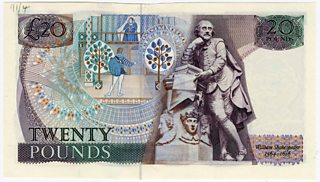Relationship matters: Shakespeare's life and loves laid bare
William Shakespeare lived two lives. In London he was an actor and an author who wrote successful plays and was famous for his poems. In his home town of Stratford-upon-Avon, he had a wife and children whom he rarely saw.
Go, Make You Ready, a new theatre piece from Guildhall School of Music & Drama, takes Shakespeare’s sonnets and interweaves them with scenes from some of the plays, to examine the Bard's relationship with his family and his wife’s view of her playwright husband. It explores the final moments of his life and the memories that may have flooded through his mind and body as he passed into death.

Go Make You Ready
A new theatre piece from Guildhall School of Music & Drama.
All the text in Go, Make You Ready is Shakespeare’s except for a few names and excerpts from the Elizabethan Book of Common Prayer, words that Shakespeare would have spoken or heard. The audience moves between two worlds – the theatre and rehearsals, and home – Stratford.
What did Anne feel when she saw her husband鈥檚 poems written to another woman?
The school's Head of Academic Studies for Drama, Eliot Shrimpton, and Dr Trudi Darby of King's College, London explain more:
Shakespeare was married to Anne Hathaway. She was eight years older than him and at the time of the wedding she was already pregnant with their first child. Two more children – twins – followed, but then, at some point, Shakespeare left Anne and the children in Stratford and moved to London.
His plays made him famous and so did his poetry. His Sonnets circulated in manuscript before they were published in 1609. This was the second scandal of Shakespeare’s life, because the Sonnets were love poems and were not written for his wife. There has always been a mystery about to whom the Sonnets were addressed. Meanwhile, in August 1596, one of the Shakespeare twins – Hamnet – had died in Stratford at the age of 11.
How did Anne and William Shakespeare maintain their long-distance marriage? How did they cope with the death of their only son in Shakespeare’s absence? What did Anne feel when she saw her husband’s poems written to another woman? What chance was there for them of reconciliation and peace?
As Shakespeare lies dying, these questions must have been very present to him. The production takes Shakespeare’s Sonnets and interweaves them with scenes from some of the plays, to examine Shakespeare’s relationship with his family and his wife’s view of her husband.
In Shakespeare’s historical world, his actors were all men. The women in his life were not actors. They were wife, daughter, lover, prostitute, confidante, friend, neighbour. In his imaginary world, Shakespeare wrote of and gave voice to some phenomenal women as well as men. In this production, we encounter both worlds. Anne, his family, friends, colleagues, lovers, acquaintances and Shakespeare himself surface as echoes from the past and take roles in the plays, perhaps as recollections of real moments from his life which inspired his writing.
The Guildhall School of Music & Drama is one of the world's leading conservatoires and drama schools for musicians, actors, stage managers and theatre technicians.
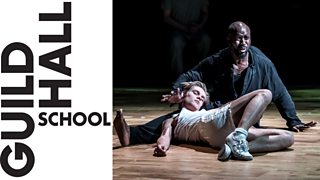
With more than 900 students in higher education drawn from nearly 60 countries, the School is a global leader of creative and professional practice and promotes innovation, experiment and research. It has twice been rated number one specialist institution in the UK by the Guardian University Guide, and recently selected as one of the top ten institutions for performing arts in the world (QS World University Rankings, 2016).

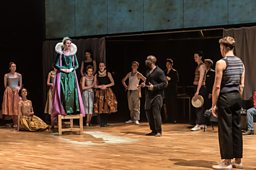
Director Patsy Rodenburg explains more:
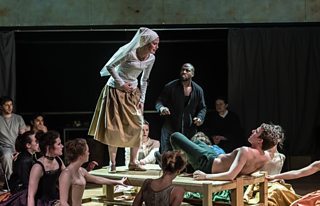
To speak and receive a sonnet with authenticity requires not only technique but an emotional courage and vulnerability, everything a great Shakespearean actor needs.
The play takes place on the evening of 22 April and into the morning of 23 April, 1616.
All the text in Go, Make You Ready is Shakespeare’s except for a few names and excerpts from the Elizabethan Book of Common Prayer, words that Shakespeare would have spoken or heard. We move between two worlds – the theatre and rehearsals, and home – Stratford.
Apart from scenes from some of Shakespeare’s plays you will hear a selection of sonnets. A sonnet is a highly structured and distilled poem, often intensely personal. Shakespeare did not invent the form but he did publish 154 of them in 1609. We don’t know when he wrote them or to whom they are addressed. For years I have used the sonnets as an introduction to Shakespeare’s language and the complexities and structures of his writing. Sonnets were often spoken to the person addressed and some sonnets would be highly disturbing to receive. To speak and receive a sonnet with authenticity requires not only technique but an emotional courage and vulnerability, everything a great Shakespearean actor needs.
Although I started with the sonnets as an educational tool I became very intrigued by their content. It seems to me that Shakespeare is practising or intensely exploring themes in his sonnets that resonate all through his plays. They seem to feed and impact his theatrical work. Themes like the mis-use of power, the tension between conditional and unconditional love, the balance between man-made and divine justice, and unrequited love. These themes are woven into personal relationships. This ability to write the epic alongside the personal is one of Shakespeare’s great theatrical achievements. His plays are epic but also domestic – dysfunctional families are bedded into every play.
The publication of the sonnets has also worried and engaged me. How did Anne, his wife, react if and when she read them? Some scholars believe one – 145 – was written to her, maybe there were others, but any intelligent, curious or concerned wife would have realised that her husband had had a rich and sexually promiscuous life outside their marriage. Maybe that didn’t upset Anne, maybe the marriage was a dead and disconnected one. Maybe.
However, my other strong sense and understanding of Shakespeare’s work was that he was obsessed with marriage and how partners speak to each other. This is explored to the point of some plays having scenes in them that do not add to or develop the plot but are only there to explore a marriage. Shakespeare only had one marriage and Anne was his wife. More revealing is that in these scenes Shakespeare always writes or has heard a very powerful and articulate female voice. All his plays bristle with opinionated women who give the men a hard time. They educate the men, call them to order and witness the truth.
It gets better: in his plays the male hero enjoys these women and actually falls in love with the most difficult, hard-to-handle women available.
Shakespeare was a powerful man and, like all powerful men, he was not afraid of a powerful woman. No other writer in Shakespeare’s time – or perhaps no male writer in any time – produced so many magnificent women. Where did he hear the voice of that magnificent woman? His inspirations are always real so I conclude it must have been Anne. The marriage was real.
The last ghost in Go, Make You Ready is that of Hamnet, Shakespeare’s 11 year-old son – the twin of Judith. Shakespeare was not at the funeral. Hamnet died on or around 1 August, 1596. Shakespeare was probably on tour with his company in Faversham, Kent. On hearing the news it would have taken him days to return to Stratford. I cannot believe that his absence from that death did not haunt this fully present, brilliant, sensitive and compassionate man.

Behind the scenes
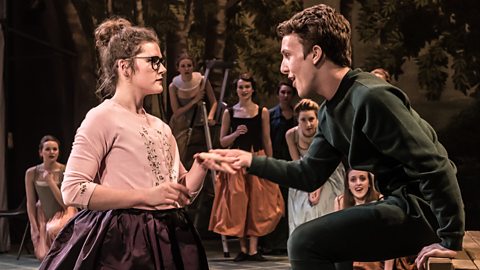
Behind the scenes
Director Patsy Rodenburg and cast talk about the creative drive behind Go make you ready.

Related links
More on Shakespeare
-
![]()
Discover more about the 200th anniversary of the world鈥檚 oldest Shakespeare performance tradition at Hamlet鈥檚 Castle, Kronborg, in Denmark.
-
![]()
How did the famous playwright became the first non-Royal, apart from Britannia, to appear on the back of a 拢20 note in 1970?
-
![]()
You may think of the Bard as a middle-aged man with a receding hairline and pointy beard, but very little is actually known about his physical appearance.

